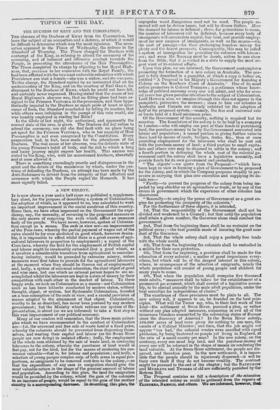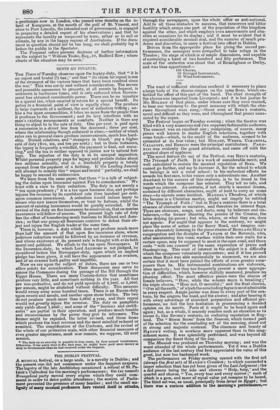A NEW COLONY.
IT is now above a year and a half since we published a supplemen- tary sheet, for the purpose of describing a system of Colonization, the adoption of which, as it appeared to us, was calculated to work an important improvement in the social condition of this country. Since then, we have often impressed on the Government the expe- diency, nay, the necessity, of recurring to the proposed measure as the only means of removing -the evils which afflict an immense body of the-people. We have never, however, spoken of Coloniza- tion except as a means. The ends in view are—an improvement of the Poor-laws, whereby the partial payment of wages out of the rates should be for ever abolished (a good which, however desira- ble, it is impossible to effect whilst there is a great excess of agri- cultural labourers in proportion to employment)' a repeal of the Corn-laws, whereby the field for the employment of British capital and labour might be incalcuably extended (but a good which, as it involves a considerable transition from agricultural to manufac- turing industry, would be preceded by extensive misery, unless measures were first taken to provide for the agricultural labourers at the moment when they should be thrown out of employment); and, lastly, a system of universal education, the chief object of good and wise men, but one which no rational person -hopes to see ac- complished whilst the labourers are kept in a state of misery by their competition with each other in the market of labour. To these happy ends, we look on Colonization as a means—not Colonization siieh as has been hitherto conducted by modern states, without thought, object, or system, but Systematic Colonization, founded on a true conception of the ends in view, and a careful provision of means adapted to the attainment of that object. Colonization, worthy to be so described, has never been pursued by any modern government; but the Ministry which reforms our system of Re- presentation, is about (so we are informed) to take a first step in this vast improvement of our political economy. Many of our readers will remember, that the three main princi- ples which we have recommended in the conduct of Colonization are—Ist, the universal and free sale of waste land at a fixed price, whereby the colonists should be prevented from dispersing them- selves, and wasting their capital and labour (as the Swan River people are now doing) in isolated efforts ; 2ndly, the employment of the whole sum obtained by the sale of waste land, in conveying labourers to the colony, whereby the purchaser of land would in fact pay, not for the land, but for the means of rendering his pos- session valuable—that is, for labour and population; and 3rdly, a selection of young pauper couples only, of both sexes in equal pro- portions, as emigrants to be removed cost-free to the colony,—so that -the expenditure of any sum in emigration should give the most valuable return in the shape of the greatest amount of labour and population. According to this plan, the fiend for emigration evould be provided by the colony, whilst the gain of the colonists in anincrease.of people, would he equal to the gain of the mother teranntry in a earrespeading decrease. In desixibing.this plan, the unpopular word Emigration need not be used. The people re- moved will not be driven hence, but will be drawn thither. Here the demand for labour is deficient ; there, for generations to come, the number of -labourers will be deficient, because every body of immigrants will accumulate capital, buy land, and provide employ moot for new cargoes of immigrants, as well as the means—virn the cost of passage—for their exchanging hopeless misery for plenty and the fairest prospects. Consequently, this may be called a system of immigration for providing the colonies with labour- ers ; and even Mr. SADLER must be dumb, unless he can show from the Bible, that it is wicked in a state to supply the most ur- gent want of its colonial offsets.
Upon this plan, we are informed, the Government contemplates promoting the formation of a new colony in Australia. The pro- ject is fully described in a pamphlet, of which a copy is before us, entitled " A Proposal to his Majesty's Government for founding a Colony on the Southern Coast of Australia." One of its most active promoters is Colonel TORRENS ; a gentleman whose •know- ledge of political economy every one will admit, and who for seve- ral years has given peculiar attention to the subject of Colonization. Lord Howicie also, we imagine (though this does not appear in the pamphlet), patronizes the measure ; since to him our colonies in Australia and Canada are already indebted for the adoption of half of the proposed system,—namely, the free and universal sale of waste land at a fixed minimum price. Of the Government of this country, nothing is repired but its sanction. The foundation of the colony is to be laid by a company- in London—who will employ one part of their 'funds in purchasing land, the purchase-money to be by the Government converted into labour and population a second portion in giving further value to their land by means population; bridges, docks, &a, thus at once providing employment for the labourers who shall be sent out with the purchase-money of land; a third portion to small capita- lists and others who may be disposed to settle in the colony; and a fourth portion in defraying the whole cost of the colonial go- vernment until the colony shall have a legislative assembly, and provide funds for its own government and protection. "The objects"—we quote from 'the Proposal—" which have been kept in view in forming a plan of' Government to be proposed for the colony, and in which the Company purposes steadily to per- . severe in carrying that plan into execution and supplying its de- tails are- "Firetly—to prevent the progress of the colony from being im- peded by any shackles on its agriculture or trade, or by any of the errors in government which the experience Of other colonies 'has discovered.
"Secondly—to employ the power of Government as a great en- gine for promoting the prosperity of the colonists." For the furtherance of these objects, it is intended, 1st, That the responsibility of the Government shall not be divided and weakened by a Council; but that until the population shall 'attain a given number, 'the Governor alone shall conduct the government. 2nd, That from the beginning there shall be no restraint on the- political press ;—the best possible mode of insuring the good con- duct of the Governor.
3rd, That the whole colony shall enjoy a perfectly free trade- wit h the whole world.
4th, That from the beginning the colonists shall be embodied in a militia for their own protection.
5th, That from the beginning, a provision shall be made for the education of every colonist ; a matter of great importance every- where, but which will be of the deepest interest in this colony, where, in consequence of the selection of emigrants, nearly the whole population will consist of young people and children for many years to come. 6th, That when the population shall comprise five thousand male adults, "measures shall be taken for the establishment of a permanent government, which shall consist of a legislative assem- bly, to be elected annually by the male adult population, under the best securities for independence of choice." The excellence of these provisions must be plain to all. The new colony will, it appears to us, be founded on the best prin- ciples. What will the Tories say, who, in their last work of the kind—the settlement at Swan River, pursued a plan, or rather without any plan adopted measures, surpassing in evil all of the numerous blunders committed by the colonizing states of Europe since the discovery of America? In the Swan River colony,. 500,000 acres of land were given for nothing to one man, the cousin of a Cabinet Minister; and then, that the job might not appear "too bad," the colonial wastes were sacrified with equal profusion, by being bestowed on people yet living in England, at the rate of a small county per man! In the new colony, on the contrary, every one must buy land, and the purchase-money of every one will be returned in the shape of means for rendering the- land valuable. At the Swan River-settlement, the people are dis- persed, and therefore poor. In the new settlement, it is impos- sible that the people should be injuriously dispersed—it will be their own fault if they do not become wealthy. The contrast might be pursued to the end of the chapter; but the BATAIIRSTE and MIIRRAYS and TWISSES of old are sufficiently punished by the Reform Bill.
- The Proposal contains as full a-description of the situation of the intended colony as could be-gathered-from the reports of runnans, BANDIN, and others. We are informed, however, Out. s gentleman now in London, who passed nine thOnths on the is- land of Kangaroo, at the mouth of the gulf of St. Vincent, and close to Port Lincoln, the intended seat of government, is engaged in preparing a detailed report of his observations ; and that he represents the locality as surpassed by none, either as to soil or climate, by any in the happy regions of Australasia. If the docu- ment in question should not be too long, we shall probably lay it before the public in the Spectator. The Proposal refers persons desirous of further information on the subject to "William Tooke, Esq., 39, Bedford Row ; where charts of the situation may be seen."



























 Previous page
Previous page